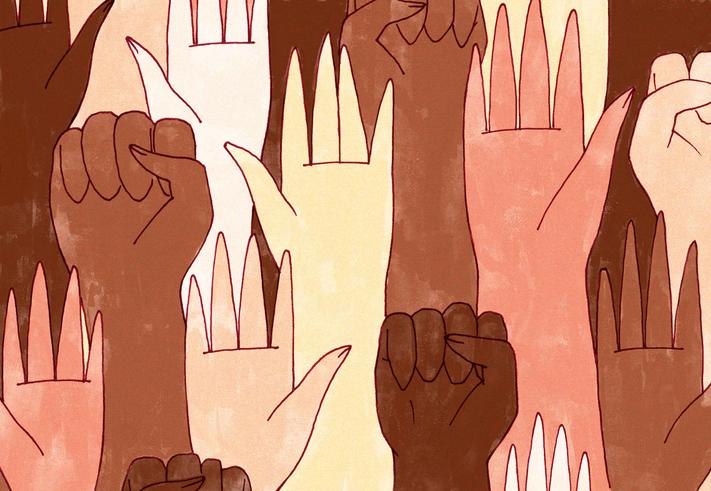As a Black academic with the privilege of working in higher education, I want to be able to share positive, life-affirming stories that will inspire future generations to consider university and doctoral studies in particular. But after working with my co-editors on the collective experiences of Black PhD students in the UK, I’m not able to do that.
Listening to, and then reading, the lived experiences of some of the brightest, most talented individuals to emerge from our communities has been heart-wrenching, inspiring and has filled me with anger. These students have had to face scepticism that they could do a PhD, they have endured outright discrimination in interviews and selection processes, they have experienced marginalisation in labs and lecture theatres. Faced with these daunting challenges, they have struggled against the odds to survive in UK academia.
- Empower minority staff and students to thrive at your institution
- How can HE institutions become fairer and more inclusive?
- The importance of Black spaces in white academia
Black students are being invited to bring plurality to the university, in ever-increasing numbers. They do so, however, on fundamentally unequal terms. They pay the same fees but are systematically awarded lesser degrees. They are afforded fewer opportunities to access funded opportunities at the postgraduate level, with the knock-on effect that they enter into employed academia later, if at all, and hardly ever reach the highest echelons of university leadership. Structural racism is the root cause of the problem, but it is the widening participation narrative at undergraduate and now, increasingly, at postgraduate level which creates false expectations. This leads to more Black suffering, isolation and disillusionment within the academy.
How is one expected to thrive and flourish within a higher education system that devalues and marginalises your culture? How is one expected to actively participate in a system where your spirituality cannot be authentically expressed? How does someone used to community and collective support operate successfully in an environment where individualism is prized and isolated endeavour the norm?
Ditch the participation narrative
Our book, The Black PhD Experience: Stories of Strength, Courage and Wisdom in UK Academia, reveals that Black students strive to participate and succeed in this often hostile environment, but that it often comes at great cost to their mental and physical health. The stories told do show pockets of very good practice, where supportive supervisors, proactive mental health support and Black support networks enable students to thrive. The overall picture, however, is one where Black students succeed in spite of the university, rather than because of it.
To fix this state of affairs and to enable Black students to thrive rather than just survive, we need a reset. We need to ditch the participation narrative and focus on empowerment. We can no longer be expected to be grateful to be given the opportunity to study for a PhD – we need power to shape and reimagine what equitable and transparent PhD application and funded programmes look like. We can’t settle for participating in yet another special project with three years’ funding to broaden opportunities for the nebulous (underserved, BAME, Black heritage, hard to reach) community.
Empower Black academics
We need permanent centres for Black interdisciplinary research in all regions of the UK. These need to be led by Black scholars committed to compassionate, community-focused Black excellence. Black people need to be in positions of power, making long-term decisions concerning Black futures in higher education.
We are well-versed in what happens when we are asked to participate in yet another diversity initiative. We put all the energy into the bids, we get community buy-in, we appear on the brochures. The universities get the money on the back of our labour and hire a few new Black faces on short-term contracts. When the project ends all the Black faces get let go as their, and our, participation is no longer required.
It is not possible to build a sustainable pipeline for Black academic success with this piecemeal approach to Black students and staff. In the wake of the heinous murder of George Floyd in 2020, Black students and our allies rose up and demanded change. Universities responded with words, schemes and charters – and yet more participation schemes!
As our work with PhD students reveals, this approach is storing up future pain for emerging Black scholars, who are literally being forced to participate within a scholarly environment that does not value them and still insists that it is their way or the highway. In our book, we call for greater transparency in the PhD application process, more mental health support for students, better and more consistent training for PhD supervisors and funding and recognition for Black support groups. It is not a total solution, but we believe it would go some way in enabling an empowered Black doctoral culture in UK higher education and stop the endless cycle of temporary initiatives.
The accounts detailed in The Black PhD Experience show that we are part of the academic landscape. The talent, tenacity and drive demonstrated by the contributors to this ground-breaking volume clearly demonstrate that Black PhD students can be a tremendous asset to institutional success. We just need to be recognised, not patronised, and empowered to thrive, not just survive.
William Ackah is reader in social sciences and African diaspora studies at Birkbeck, University of London.
The Black PhD Experience: Stories of Strength, Courage and Wisdom in UK Academia is published by Policy Press and edited by William Ackah, Jacqueline Darkwa, Wayne A. Mitchell, De-Shaine Murray and Madina Wane, featuring 27 contributions by Black PhD students past, present and future.
If you would like advice and insight from academics and university staff delivered direct to your inbox each week, sign up for the Campus newsletter.




comment